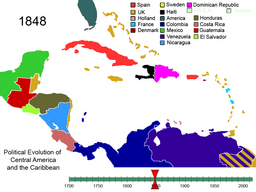CARIBBEAN HISTORIES REVEALED: 20TH CENTURY TRANSITIONS (NATIONAL ARCHIVES, UK)
The late 19th century brought improvements in communications by telegraph cables and travel via steam ships. These many advances helped to make tourism a defining element of Caribbean life, with Americans and Canadians visiting the islands to escape the long northern winters.
During the First World War, Caribbean people travelled abroad to serve with British armed forces alongside other [involuntary] members of the Empire.
Initially, West Indians volunteered, but were rejected by the British authorities.
As the war progressed, the volunteers were accepted but were often given menial jobs and were posted to battles outside Europe. The various islands also gave money and local products for the war effort. Also, some islands maintained prisoner of war camps in which German civilians and sailors were held.
Political and labour changes swept through the islands in the form of Pan-Africanism, nationalism, Garveyism, and unionisation. From Jamaica to Trinidad Black intellectuals and everyday people challenged local social and political establishments by fighting for changes in their constitutions and the right to vote.
It was also a time of massive reform of towns and government institutions. Businessmen, smugglers and merchants alike took advantage of the economic opportunities open to them. Cartels existed on some islands, and Bahamas was used by Americans to consume and buy alcohol during Prohibition.
The Caribbean is home to both a rich heritage and diverse mix of people. It is a centre of modern migration, resulting in a large diaspora in America, Britain, and Canada.


Editor’s Note: At the time that this picture was taken, Antigua was under British Colonial rule. Its people were not self-governing, no means or permission to build infrastructure and no access to finances, unless given to them by the British. The very existence of this photo proves that the British were content to let their subjects live in abject squalor, document it and send it back for filing in their National Archives now located in Kew, London.

Source: https://www.nationalarchives.gov.uk/caribbeanhistory/twentieth-century-transitions.htm




